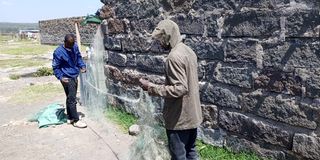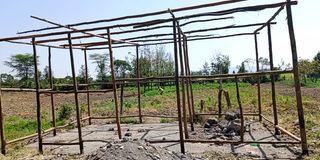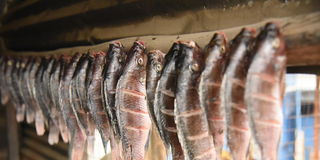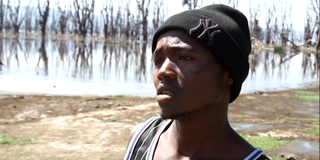Troubled waters: Inside the vibrant illegal fish trade in Lake Nakuru

Some youth from Mwariki preparing their nets in the afternoon ready to cast them in Lake Nakuru in the evening for a catch.
When Lake Nakuru burst its banks in 2020, it came with goodies.
Fish, never seen before in the Lake were suddenly present offering a reprieve to the residents who were contending moving out of a place they had called home for years, after the waters found a home at their doorsteps.
As a way of focusing on the silver lining on a very dark cloud, some of the residents quickly changed profession to become fish vendors.
Men and women alike put the shock and sadness aside and armed with fishing nets, dove into the Lake in search of fish.
This they would sell at surprisingly good enough prices cushioning them from the double tragedy of Coronavirus and a swelled up lake.

A fisherman displays some of the fish harvested from Lake Nakuru.
Joseph Edebe, a senior researcher at Kenya Wildlife Service (KWS) says the fish was accidentally introduced in Lake Nakuru after a fish farm uphill spilled fingerlings and mature fish into River Ndarugu which drains into the Lake.
“Consequently, the fish populated since we did not have any fish predators in the lake. Locals then began fishing especially when the lake had flooded into their farms,” he explains.
Beatrice Wangui, recalls how she dropped her job as a hawker in Nakuru town to join the fish business.

Beatrice Wangui, a resident of Mwariki.
Having lost everything in the devastating floods, Wangui saw the fish as manna from heaven. Here, she could find money for rent, and school fees for her three children.
But the joy was short lived as a Research by the Kenya Marine and Fisheries Research Institute (KEMFRI) revealed that fish tissue samples from the lake contained high levels of nitrates and traces of other dangerous chemicals.
What followed was a ban on fishing and stringent measures employed by KWS with an aim of keeping residents from dipping their toes in this newly found fortune.
For a short while, the trade went quiet. Only until the residents devised new ways of fishing away from the eyes of the KWS officers.
“Earlier, we would fish using boats. However, we currently go into the water on foot risking attacks from hippopotamus living in the lake. Every time I get in this lake, I do no not know if I will come out alive, but I have to do it,” Ms Wangui laments.
Wangui’s motivation is a desire to have a temporary structure for her family which she believes the daily Sh 500 from the fish trade is a great place to start.

A house Beatrice Wangui is trying to put up after she brought her house down in 2020 when Lake Nakuru flooded. She is using the money she gets from selling fish to rebuild her life.
Shockingly, Wangui reveals that most of the fish caught from Lake Nakuru circulates in the Nakuru fish markets and beyond.
“Women from Shabab area, Nakuru Top market, Free Area, Kivumbini, Bondeni, and Nga’mbo among other areas frequent this place in the morning to buy fish.”

Fish caught in Lake Nakuru being sold at Langa Mwisho in a fish joint.
Better yet, Wangui says the fish crosses the county boarders, to Busia and Budalangi as there are fishermen from these regions who have set camp at the lake.
“They (fishermen) get to fish heavily as they have access to makeshift boats that they sneak into the Lake at night. They get a huge and better catch because they are able to cast their nets deep in the lake where the fish are bigger and more,” she continues.

A boat previously used by locals to fish in the flooded waters of Lake Nakuru before the water receded.
Okwemba, a young man from Bangladesh area, says his peers from Kaptembwo, Ng’ambo, Kapkures, Bondeni, and Kivumbini among other areas, flock the lake at night to fish, sighting joblessness as a key driver making young boys turn to illegal fishing to make money.
“We get in the lake to fish despite knowing we could be arrested anytime for doing it. How do I allow my child to sleep hungry when there are plenty of fish in the lake? I just want to provide for my family,” says Okwemba.

Okwemba who gets fish from Lake Nakuru despite fishing activities being banned.
The young man says when they are caught, the residents are arrested and charged in court.
“Some people have been killed by hippos. Others have been arrested and forced to pay fines of not less than Sh 20,000. In all my years of selling fish, I have never made anything close to that fine,” he says.
Okwemba says many of the young men remain behind bars and serve the term attached to the offense.
The Assistant Director at Lake Nakuru National Park, Titus Mitau, shares that the wildlife act prohibits consumptive utilization in the park therefore locals should not be fishing in the Lake.

The Assistant Director at Lake Nakuru National Park, Titus Mitau.
“Fishing in the lake is prohibited. That is the main reason the youth are complaining about being arrested. If one is caught fishing in the lake they are presented to the court on charges of illegal access to the park (trespassing) and for fishing in the lake,” says Mitau.
